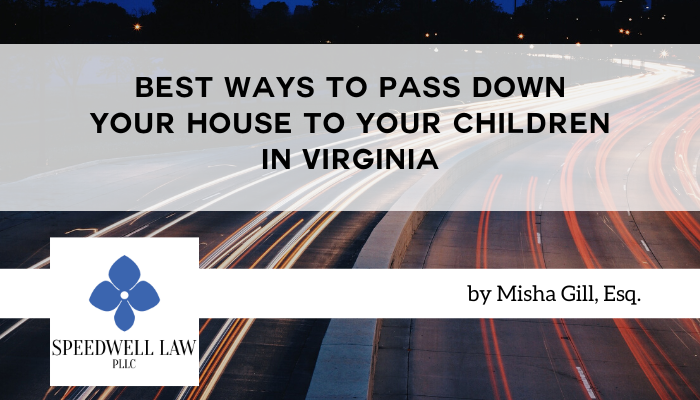
Best Ways to Pass Down Your House to Your Children in Virginia
Good estate planning allows you to care for your family during your lifetime and even after you pass away. One of the most important estate planning decisions you may need to make is how to pass down your house to your children.
Putting the right plan in place will avoid family infighting and make it easier for your children to inherit your home after you pass away. It can also save your children a lot of time, money, and stress.
Proper estate planning is one of the best legacies you can leave for your loved ones. Keep reading to learn the best ways to pass your house to your children.
1. Gift the House
Gifting the family house to a child might be the easiest thing to do, but it may come with unforeseen consequences. Gifting your house to a child can put you in a difficult position if your child goes through a divorce, bankruptcy, incurs liability due to a lawsuit or other financial problems that may require reselling the house to satisfy their debts and liabilities. There are also important gift tax consequences that must be carefully considered. If you need to move out of your house suddenly and without warning, it may be easiest to gift the property to a child. However, estate planning attorneys generally have better techniques than this.
2. Sell the House
You may also sell your house to your children. But if you sell the home for less than fair market value, it will be considered a gift, and be subject to the same gift tax consequences as if you had gifted the house to your children. There are ways to get around the gift taxes issue, but these can be very tricky and require the help of a qualified attorney to ensure that you will not create even greater tax problems for yourself.
3. Use a Will
The easiest way to pass a home to your children is by simply drafting a Will and designating a beneficiary for your home in your newly drafted Will. The problem with this method is that a Will must be probated. Probate can take time (a year or longer), lacks privacy, and can eat up a sizable portion of your estate. Furthermore, a will can be contested by would-be beneficiaries who are not happy with your choice of beneficiary for your house.
4. Create a Life Estate
Creating a life estate will allow you to transfer part ownership of your house to a child during your lifetime. You can live in the home or rent it out during your lifetime, and when you pass away, the remaining ownership passes to the child to whom the house was transferred, who may then take full possession and ownership of the house.
The downside of a life estate is that once it is set up, you won’t be able to sell, mortgage, or control what happens to the house after you die. What’s more, you will be vulnerable to the debts and liabilities of the future beneficiary of the life estate, and you can lose the house if it needs to be sold to satisfy your beneficiary’s debts.
5. Use a Trust
Think of a trust as a bucket that holds your assets, along with a set of rules and instructions about what happens to those assets when you pass away. In that respect, a trust can function like a will by designating a beneficiary for your home.
But a trust allows you to do much more than a will. A trust allows you to dictate the terms by which a beneficiary can inherit from you and plan for periods of incapacity during your lifetime. Also, assets held in a trust bypass probate, making the transfer of property private, quicker, and often less expensive than passing through a will.
Contact an Experienced Virginia Estate Planning Attorney for More Information
A person’s home is often the single biggest asset they own, and determining the best way to pass down their home to their children is often the most significant estate planning decision a person must make.
An experienced Virginia estate planning attorney can help determine what’s best for you and your family, and assist you by putting the right documents in place to ensure your wishes are fulfilled.
Contact our law firm today at (703) 553-2577 or use the contact form to arrange a consultation with an experienced Virginia estate planning attorney.
The information on this site is for general informational purposes only. The information presented in this site is not legal advice or a legal opinion. You should seek the advice of legal counsel of your choice before acting upon any of the information in this site.





